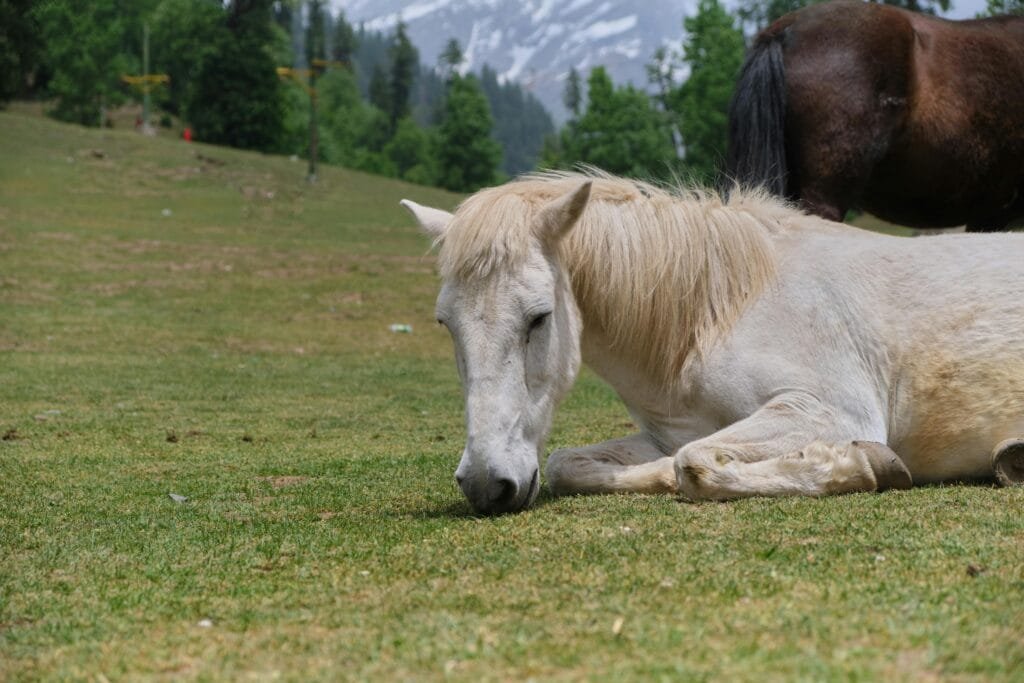Horses are incredible animals, and like all living creatures, they need rest to stay healthy and perform at their best.
While they don’t need as much sleep as humans, it’s still important to ensure they get the right amount of rest to support their physical and mental well-being. Here’s what horses need for quality sleep:
1. A Comfortable and Safe Environment
For horses to sleep well, they need a quiet and comfortable space where they feel secure. Horses are prey animals, so they are always alert to potential dangers in their environment. A safe, enclosed area, such as a stall or pasture with proper fencing, is essential for their peace of mind. The area should be free of loud noises, sudden movements, or anything that might startle them.
2. A Soft and Dry Sleeping Surface
While horses can sleep standing up, they need to lie down for deeper, restorative sleep. A soft, clean, and dry surface is ideal for them to rest comfortably. Bedding such as straw, shavings, or sawdust in their stall will make it easier for them to lie down and get quality sleep. A wet or dirty surface can be uncomfortable and lead to skin issues or even infections.
3. Access to Fresh Air
Horses need good ventilation to maintain their overall health. Stale air can lead to respiratory issues, which can make it harder for them to relax and sleep. If your horse is kept in a barn or stall, ensure there is enough airflow to keep the air fresh. Proper ventilation can also help reduce the buildup of dust and ammonia, which can irritate the respiratory system.
4. Consistent Routine
Horses thrive on routine. Having a consistent schedule for feeding, exercise, and rest helps them feel secure and comfortable. When a horse’s daily activities follow a regular pattern, they know when to expect food, companionship, and sleep. Disruptions to their routine, like irregular feeding times or sudden changes in their environment, can lead to stress and disrupt their sleep.
5. Time for Resting and Napping
Horses don’t need to sleep for long periods at once, but they do need plenty of time to rest and nap throughout the day. They tend to sleep in shorter intervals—about 15 to 20 minutes at a time. Horses usually sleep in the early morning or late at night, but they can also take naps during the day when it’s calm. It’s important to provide them with enough opportunity to rest, especially after physical activity or exercise.
6. Exercise and Mental Stimulation
While rest is essential, horses also need regular exercise and mental stimulation. Physical activity during the day helps them release energy and settle down more easily at night. A horse that is kept in a small area with little to do may become anxious, leading to difficulty relaxing and sleeping. Providing exercise and activities like turnout, free roaming, or even working with them in a calm, controlled environment can help them sleep better at night.
7. Proper Diet
A balanced diet is crucial for a horse’s overall health, including their ability to sleep. Horses should have access to fresh hay, grass, or high-quality forage to meet their nutritional needs. A consistent feeding schedule and avoiding large meals right before bedtime can help keep your horse’s digestive system happy. Ensure that fresh, clean water is always available, as dehydration can disrupt their sleep.
8. Companionship
Horses are social animals and often sleep more peacefully when they have companionship. Whether it’s another horse, a friendly barnmate, or a human caretaker nearby, having someone to bond with can reduce anxiety and help the horse feel secure. Horses are often more relaxed when they can see or be near others they trust, which can encourage better sleep.
9. Temperature Control
Horses are sensitive to temperature extremes. Very hot or very cold weather can make it difficult for them to sleep well. In cold climates, horses need a warm, dry environment with proper shelter to protect them from the elements. In hot climates, providing shade and plenty of fresh water is important. If your horse is kept in a stall, make sure it is not too hot or stuffy during summer, and provide plenty of ventilation to keep the temperature comfortable.
10. Regular Health Check-ups
Lastly, horses that are in good health are more likely to sleep well. Regular vet check-ups are essential for detecting any health issues that might affect their sleep quality, such as joint pain, respiratory problems, or digestive concerns. Ensuring your horse is free from discomfort or illness will help them get the rest they need to stay healthy and happy.




